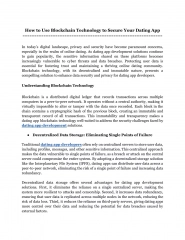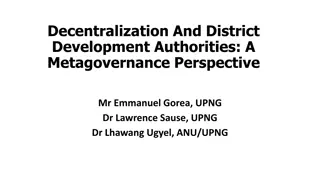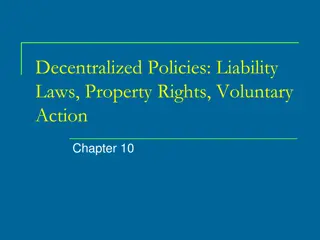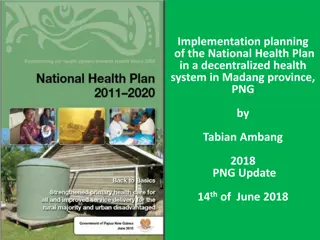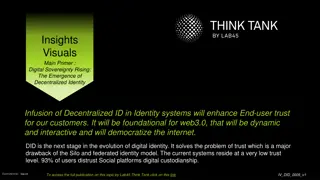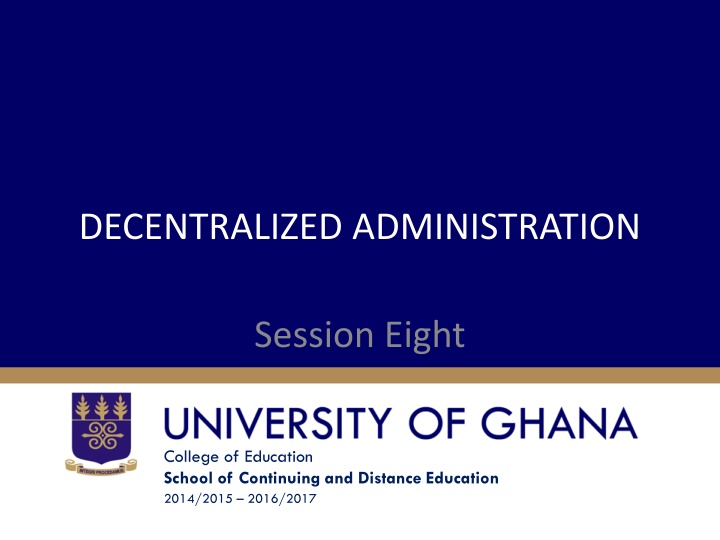
Decentralized Administration in Education
Decentralized administration in education involves the transfer of authority and responsibilities from a central government to lower levels. Topics covered include defining decentralization, typology of decentralization, merits, and demerits. Explore the benefits of fostering interaction between central and grassroots officials.
Download Presentation

Please find below an Image/Link to download the presentation.
The content on the website is provided AS IS for your information and personal use only. It may not be sold, licensed, or shared on other websites without obtaining consent from the author. If you encounter any issues during the download, it is possible that the publisher has removed the file from their server.
You are allowed to download the files provided on this website for personal or commercial use, subject to the condition that they are used lawfully. All files are the property of their respective owners.
The content on the website is provided AS IS for your information and personal use only. It may not be sold, licensed, or shared on other websites without obtaining consent from the author.
E N D
Presentation Transcript
DECENTRALIZED ADMINISTRATION Session Eight College of Education School of Continuing and Distance Education 2014/2015 2016/2017
Session Overview Most scholars and policy makers regard decentralization as a solution to problems identified in the practice of centralized administration. This is because unlike centralization, decentralization fosters close interaction between central and grassroots officials and groups that operate at the lower echelon of society. Slide 2
Session outline The important topics to be considered are: Topic one: Explaining decentralization Topic two: typology of decentralization Topic three: merits of decentralization Topic four: demerits of decentralization Slide 3
Explaining decentralization Topic one College of Education School of Continuing and Distance Education 2014/2015 2016/2017
Defining Decentralization It is the transfer of authority from a higher level to a lower level. It is the transfer of responsibility from the central government to sub-national government. It is the transfer of specific functions, such as administrative, political and economic by government to quasi-independent private organizations and local governments. Slide 5
Typology of decentralization Topic two College of Education School of Continuing and Distance Education 2014/2015 2016/2017
Devolution or Political Decentralization It is the transfer of specified responsibilities and resources from the central government to autonomous units of local governments (units with a statutory/constitutional basis for power)i.e. local communities represented by their own lay or elected officials. The most distinctive character of devolution is that the transfer of power is based on constitutional provision. Local governments are semi-autonomous bodies. Slide 7
Deconcentration or Administrative Decentralization transfer of responsibilities from central government ministries and agencies operating at the capital cities to field offices of those agencies. It takes the form of redistribution of decision making authority, financial and management responsibilities among different levels of the national government. It involves shifting responsibilities from central government officials at the headquarters to those working in the regions, provinces or districts and sub-district levels. Slide 8
Definition of Delegation It refers to the central government transferring some responsibility for decision-making and administration of public functions to semi-autonomous organizations. The organizations are not wholly controlled by the central government but, ultimately, accountable to it Slide 9
Fiscal/Economic Decentralization the transfer of financial resource from the centre to the periphery (local governments) to carry out assigned functions. May involve taxation powers. a percentage of taxes collected or budgetary allocations. may be transferred from the central government treasury to agencies of government at the local level. Power over development planning. Slide 10
Merits of decentralization Topic three College of Education School of Continuing and Distance Education 2014/2015 2016/2017
Merits of decentralization Fosters Democratic Processes promotes local participation in the decision making process. Accountability closeness of representatives to the people allows for effective scrutiny. Political Stability Political stability is secured by the participation of the people in local government. It improves the prospects for efficient service delivery. Development freedom to design and implement their own development. Slide 12
Demerits of Decentralization Topic four College of Education School of Continuing and Distance Education 2014/2015 2016/2017
Demerits Decentralization Corruption - it may give rise to waste and corruption. Elite Capture of Power it is observed that it strengthens the power base of the local elite. Inequality it may deepen imbalanced development. Succession When fully operational, it could dislocate the nation. Slide 14
Sample Question Decentralization is preferable to centralization . Discuss. Outline and examine the factors that obstruct successful decentralization. Slide 15
References Conyers, D. (2007). Decentralization and Service Delivery: lessons from Sub-Saharan Africa. IDS Bulletin 38 (1): 18-32. Ayee, J.R.A. (2008). Reforming the African Public Sector: Retrospect and Prospects. CODESRIA Green Book: Dakar. Slide 16

